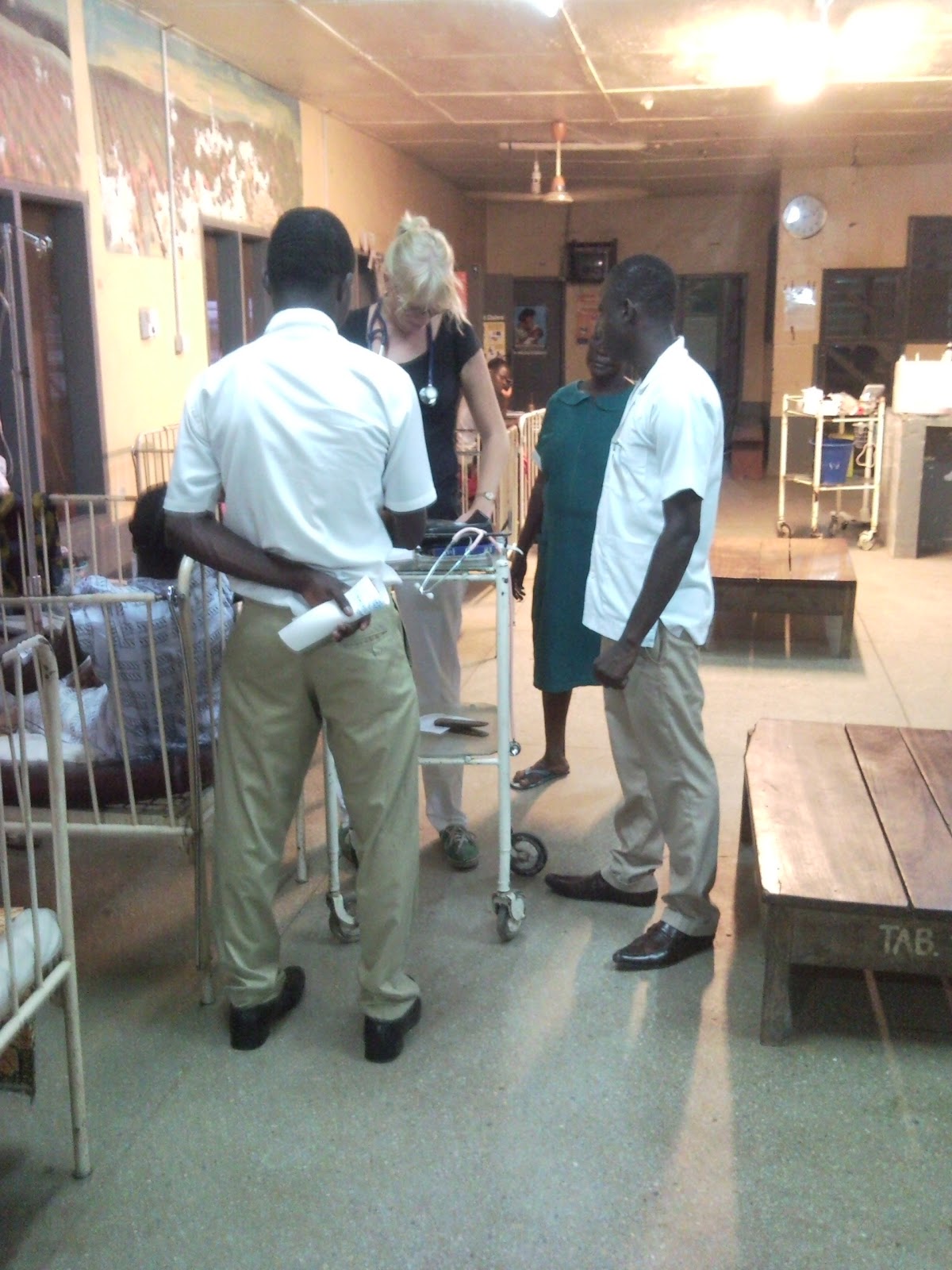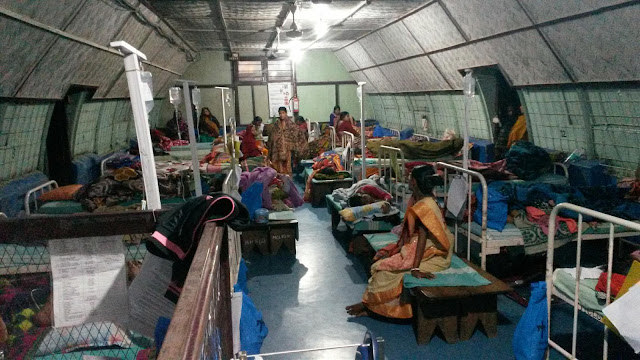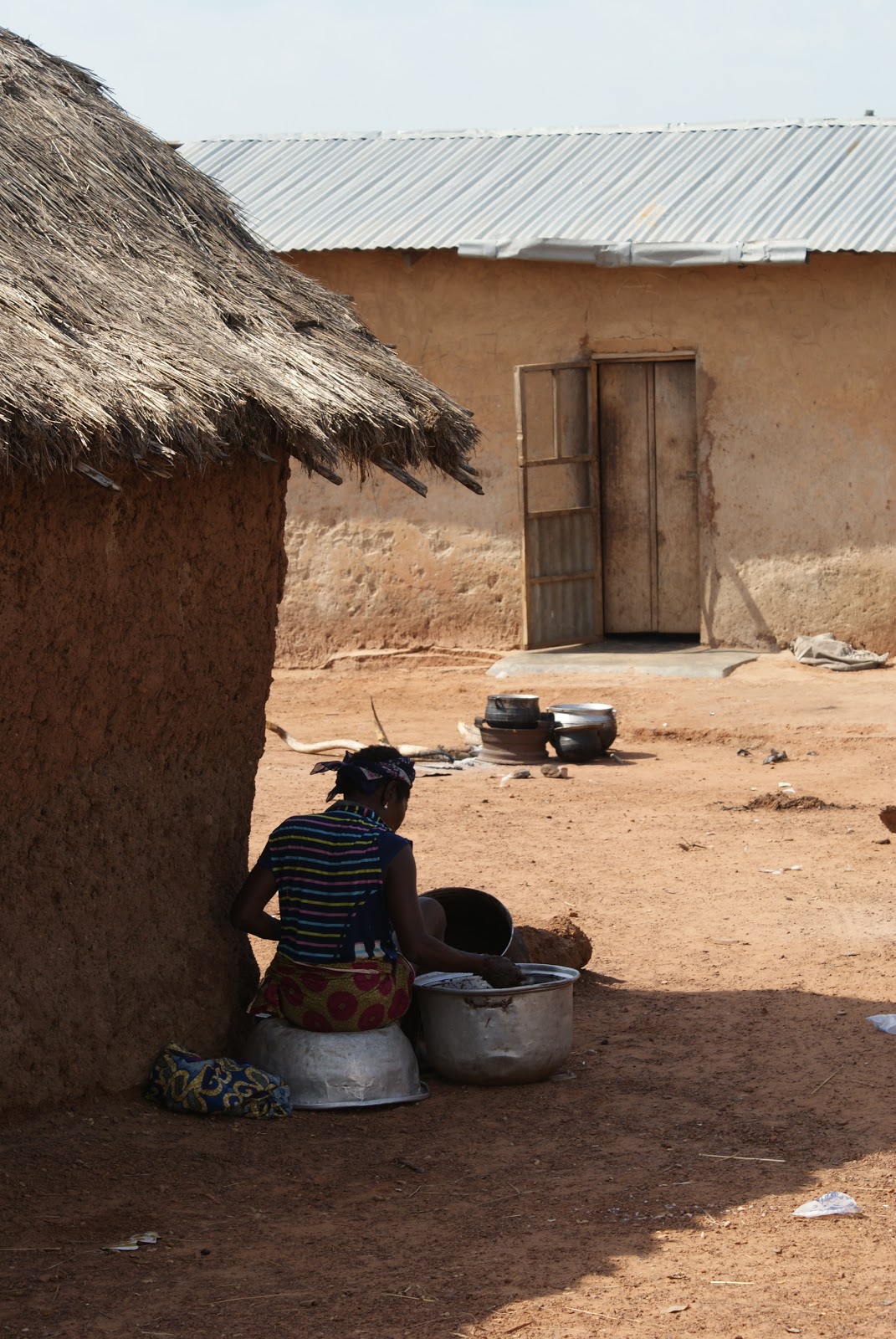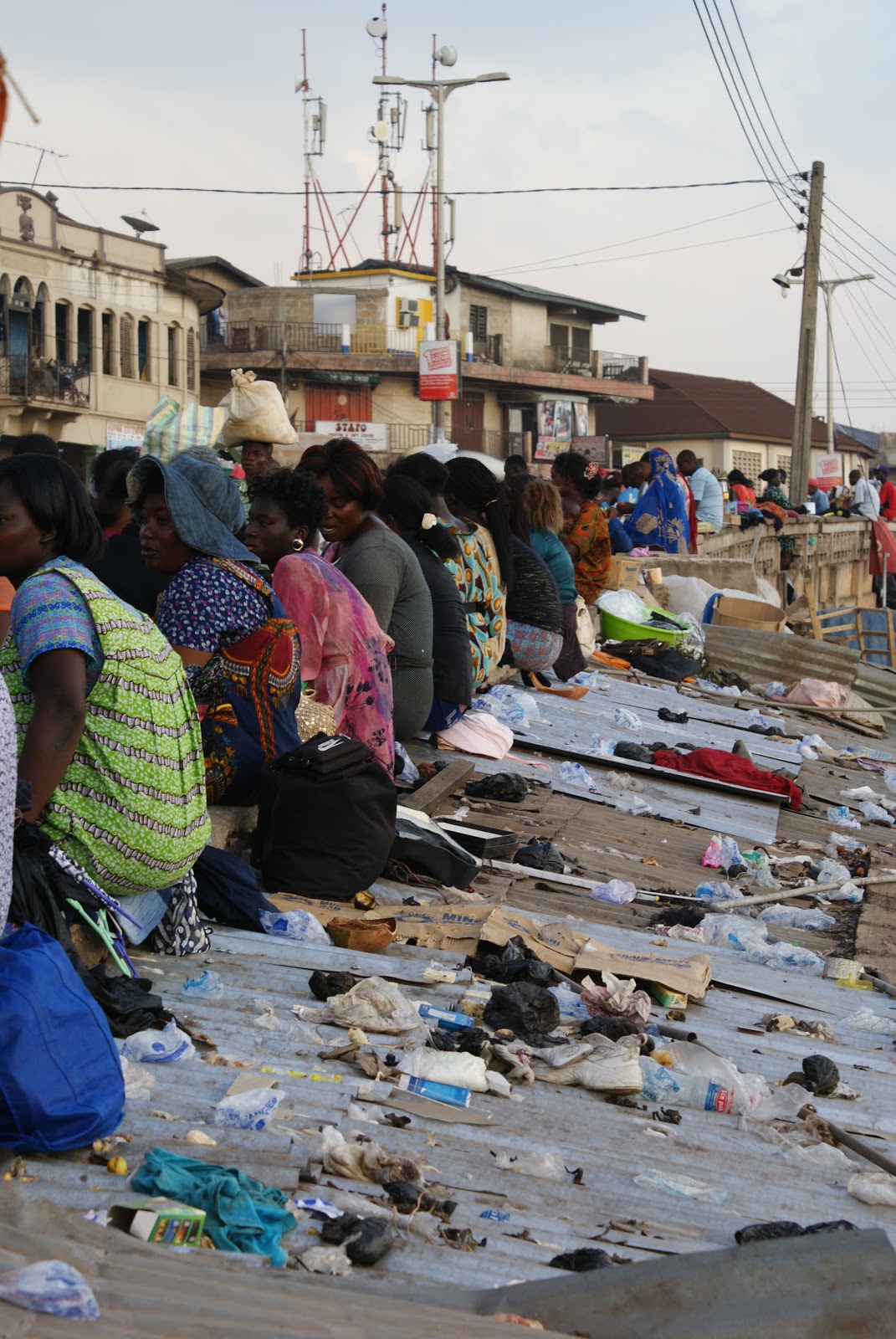Monday, 17 February 2020
Risks
Monday, 19 June 2017
Quick fix
The father looks at me like we have asked the impossible. “Does she menstruate already?” Her mother died during childbirth. He is the only one taking care of the children, how could he know such women’s business? Because saying that he doesn’t know is not always culturally accepted (something quite difficult when asking for directions...), he just keeps quiet and stares at us. His 14-year old daughter was admitted with severe abdominal pain caused by litres of urine collected in her bladder. It turned out she had actually started to menstruate, but even she herself did not know. Due to an imperforated hymen her menstrual blood was collecting in her vagina unable to get out and pressing on her urinary tract. A small and simple operation was all it needed to be solved.
The last month I have been taking care of the surgical patients together with the local surgeon. With decades of experience in this hospital, all operations seem simple for his hands. I really enjoyed doing surgeries again. Surgery can often be very satisfying: although very simplified, the patient comes in with a problem, you do a surgery and the problem is solved (hernia inguinalis, appendectomy, fribroma’s of the breast, etc). But as you might expect, in Makunda that is not quite the case. Patients come late, very late. After days of excruciating abdominal pain and distension their relatives bring them in to the hospital. By that time surgery is hardly enough anymore, and sometimes with or without surgery the chances of survival are almost nil. We find cancers growing through organs, large parts of intestines that have been cut off from their blood supply or litres of puss. But still we try, and fortunately for some it is the ‘fix’ we were aiming for, or at least an improvement of the quality of life that is left.
According to Inge’s weather app it is around 38 degrees here now, which feels like 46 degrees due to the humidity. The operation theatre has air-conditioning however, just another reason why I like spending time there. Nevertheless, during a quite complicated caesarean, I found myself asking the nurse to wipe my forehead because my sweat was about to drip unto the wound. Who needs a workout when you can just do a caesarean!
The hospital has been in the highest gear the last couple of weeks, working towards an accreditation of the national board for hospitals. Besides men working day and night to give the hospital a fresh dash of paint, we suddenly are wearing nametags (“It’s a patient’s right to be able to identify staff”), and literally everything in the hospital has a sign. From the very practical numbering of locations in the hospital (number 2 is the counter, number 31 labour ward, number 8 the lab etcetera), to every single dustbin and sink (‘hand washing area number 1’). You could easily teach yourself English just by walking around here for a while; there is no object without a tag.
Very much like my own habits during university, it is remarkable how much can get done in view of a deadline. The hospital now has a fire drill, complaints committee, and well-written guidelines for employees. Two years of work and decent sprint towards the deadline has resulted in a leap forward for the hospital, the inspector has only given minor revisions to achieve the first level of quality. Makunda really is an example of what hard work and dedication can bring!
By now I have come to the point that it is difficult to think of what I should write. I have become used to life here and the funny little different things that come with life in a different country. Within a few days one of the doctors that will take our place will arrive. So cliché, but it feels not too long ago that I came here. On the other hand, if I think of all I have done and learnt, it could have easily been much longer than 6 months ago. Anyways, it is not over yet, I first have few more weekendless weeks of work ahead of me... Makunda life, that is!
Thursday, 11 May 2017
Focus!
“It’s time to focus! All I ask of you is to focus. (...) When you go to the floor, focus on your core!” While looking straight into the camera, with his perfectly toned body and American enthusiasm (“How are we feeling? Amaaaaaazing!”) Shawn T from T25 workouts is directing our every move. When early sunsets and long shifts don’t give us the opportunity to go out running (which is more the rule rather than the exception), this is our way of clearing our minds from hospital matters. With the increasing heat and the humidity of nearly 100%, we look like two dripping monkeys jumping around in our living room. “Don’t run from the work, FEEL the work!”
Before our two-week leave, working was basically all we did. The doctors able to do obstetrics and gynaecology had reduced to just Inge and me, so we alternated 24-hr shifts without compensation and followed by busy days. During March a German gynaecologist joined us, but soon the word of mouth travelled and only more patients kept coming during the day. At night she was our back-up on call, but fortunately she did do some night shifts to relieve us a bit. Our focus was on keeping the labour ward running, little energy was left to do that little bit extra for patients. Or anything else but sleeping, really.
Although our focus was on the patients, too many times the focus of the family members wasn’t on their daughter, sister, or wife. A young woman with a pregnancy outside her uterus (an ectopic pregnancy) was bleeding heavily in her abdomen and in need for emergency surgery. However, to do a surgery on a woman it is not her consent you need, but that of a male relative. In this case her father refused the surgery, even when we offered it free of charge. He thought it was not necessary for his daughter to get such a treatment, especially because his son had broken his wrist, so she had to be home and take care of him. Though clearly she did want to have the surgery, and was well aware of her situation, I pleaded with the hospital owners to just grant her wish and do it. They agreed and I was standing ready in the OT, but eventually the woman herself decided that going against her family also meant having no life, so with tears in her eyes and a haemoglobin level far below the transfusion level they took her home against medical advice.
The same day the family of a woman who lost a lot of blood during labour refused to bring blood from a hospital a few hours away (we don’t have a blood bank, only a few pints in stock). It was not that they did not have the money, or the time, or... who knows what. They just did not care. Ironically, at the end of that day I realised it was International Women’s Day.
In case some of you are still imagining a romantic life in The Tropics for me, including sunset drinks and lazy sunbathing, I would like to tell you that summer indeed has come. But summer in Makunda means not only heat but more so rain. And lots of it. And then even more. And then just a bit more. The tin roofs make it sound like it’s raining rocks instead of water drops, and make the whispering women inaudible. The roads to the hospital get washed away and turn into mud waterfalls, but nonetheless the women come dressed in their colourful sarees and look as if nothing has happened.
It also makes the phone network very unreliable and often non-existent. And this is where Kaku enters the scene. Kaku basically means ‘mister’ and can be said to any man, but in this context it is the watchman. If there is no network he will run to our house in the middle of the night with a small note from the nurses: “Dr. Geerte ma’am, we would be very pleased if you come. Thank you.” Then he runs through the rain to all the houses of the OT staff if we need to do a caesarean (fortunately I have not had severe foetal distress during really bad weather... don’t want to think about what will happen in that case), and lends me an umbrella to cross the uncovered corridors in the hospital on the way to the OT. Kaku saves the rainy days.
The rain also brings a lot of fungus. On the patient’s skin, on vegetables, on our clothes, and even on my laptop cover. But before you start to think life is grey and depressing here in Makunda, the good thing about tropical showers is that after the rain almost always comes the sunshine.
PS. see below for some pictures of our really nice holiday and Guido’s visit (yay! so good to have him here!)
Tuesday, 21 February 2017
Cry Baby Cry!
Just when I get that tumbling sensation right before you really fall asleep, the sound of my phone pulls me out of it. “Ma’am, this new patient, the babies heartbeat is very low ma’am!” While asking for some more information, I dive out of my mosquito net and swiftly walk to the hospital. The walk is just the right amount of time to organize my thoughts, the moment I step into the labour ward I can act immediately. Luckily the woman is fully dilated, so I decide to do a vacuum delivery. The baby needs a little bit of help with breathing, but recovers nicely. As you can imagine, the sound of a strong newborn cry is very soothing on moments like this.
While I’m still standing over the newborn, in the corner of my eye I see a woman coming in on a stretcher with something small and grey between her legs. While my mind is still trying to figure out what it just saw, I step towards her and realize that it is a tiny preterm baby partly delivered in breech. With some difficulty I deliver the head of lifeless body, and even though the umbilical cord had stopped beating for an unknown time already, to my surprise the baby gasps for air once. I quickly place it beside the other baby on the bed and start resuscitation. I cannot help but laugh out loud when this little creature turns pink and grabs my hands to push away the mask I have placed on his mouth. That cry! The difference in size is remarkable to the other baby, but the preterm little one is easily compensating for its size (not even 1,3 kg) with the sound of its cry. Unfortunately this one will need more strength than just a strong cry to survive the next few days, but I won’t let that thought cloud the joy of this moment.
After seeing some new admissions I go back to my bed. An hour later I am called again, this time it is a woman in labour who has had a caesarean with a previous pregnancy and is now in labour again. The heartbeat of the baby is not very good and she is having pain near her scar. I decide to do a caesarean again. When I open the abdomen the baby’s hand waves at me even before I have opened the uterus: her uterus has ruptured! Luckily I was just in time and I can quickly deliver the baby and repair the quite extensive damage.
Later that night there are a few more admissions, and two other caesareans. When I look outside after finishing the last one, I see that the sun is rising already. Within half an hour my day shift starts. When I walk home looking forward to a quick bucket shower, I pass Inge who tells me that the gas is finished so I won’t be able to heat the water on the stove... Oh well, I guess cold water will wake me up more anyway.
Shifts like this are not really an exception, but somehow we manage to just continue. It is when the stories don’t end well that I notice that I am tired. When a woman arrives for an antenatal check up and tells me she hasn’t felt her baby move for a few days, I suddenly hate it all. My ultrasound confirms what I feared; her baby has died inside her. Was it the severe anaemia? Was it an infection? I don’t know, and will not find out. But it happens too often, and when I am tired I physically hate it. I hate the fact that she is too poor to eat healthy, too poor to take time to come to regular check-ups, that there is nothing I can do and even I couldn’t have prevented it, that her culture does not allow her to cry about it longer than a few minutes, that I can’t talk about it with her because of the language barrier, that her family gets to hear it first and sometimes waits to tell her quite some time. I have to look away, swallow away the lump in my throat and then just continue. There are 6 more women waiting for an ultrasound and even more on the way. Maybe among them there is one that I can help again, a malfunctioning placenta that I can spot before it stops working and induce labour earlier.
On my way home I walk past the nursery to see how miracle baby is doing. The little fellow is still there, frantically waving its little arms. Smiling again I walk home, looking forward to a night of undisturbed sleep, a night without phone calls. It’s the many little victories that count.
Sunday, 29 January 2017
Bundels of Joy
When the sisters start to sing, it is time to go to the hospital. It’s not much longer than a five-minute walk from the staff quarters (a few single-storey buildings surrounding a badminton field) to the hospital. The short uphill walk takes us past two swamp-like ponds that shimmer in the morning light. At first sight it feels like the hospital is situated in some kind of damp tropical forest, with birds, squirrels, frogs that keep me awake at night with their mating sounds, and enormous spiders (yes... that also). But after becoming more familiar with the surroundings, the hospital is more like a single green island among barren rice fields.
It is not just a green island, but also a Christian island, within an area predominantly Islamic or Hindu and with only a minority of Christians. An island filled with dedicated, very hard working nurses and a few doctors, driven by their desire to serve the poor and God above all. I admire their desires, their dedication without complaint. I make 6 or 7-day working weeks, with every third day a 24-hour shift without compensation, but I am here for ‘just’ 6 months. The couple that runs the hospital is committed for a lifetime, the few other doctors that are in their team are also here long term. They are often the only specialists, and on call 24/7. This hospital was built up from almost nothing, to a well functioning pro-poor hospital with an always busy maternity (obstetric) ward, a female, male, paediatric ward and even an intensive care unit were critically ill patients are treated with limited resources.
It is hospital life in survival modus. Within two weeks the whole ‘Obstetrics Emergencies’ book was covered. From doing a vacuum delivery in between seizures of a severely eclamptic patient not responding to the medication (NL: zwangerschapsvergiftiging), to running to the operation theatre to do a ceasarean for foetal distress. But also things you can’t even imagine in the Netherlands like a woman who came with 2 meters of her intestines stuck in her uterus due to a perforation of her uterus after a curettage by an unskilled person. Contraceptives are not always accepted and abortions are illegal, with the consequence that unskilled people perform them in secret, non-sterile and in ways unimaginable.
Besides the caesareans, and the difficult and severe cases, many women deliver healthy babies without complications, about a dozen per day. The experienced nurses hop from ‘bed’ to ‘bed’, and check if there are any hairs visible yet in the ‘bacha rasta’ (‘the way of the baby’). The labour ward has 4 metal flat tables, one wooden low table and two stretchers, usually all filled with women in the last part of their labour. All flat on their back, spaced less than a meter apart, they endure the labour pains together. Men are not allowed in this domain of sisters (‘didi’ in Bangla), but have to wait outside until the baby is shown to them.
While shouting the name of the mother, the little bundle is brought to meet the relatives. The father and grandmother eagerly unwrap the part that covers the sex of the baby. It is not who the baby resembles that will spark their joy, but only male genitals can count on thrilled exclamations. Both the mother and the relatives don’t even try to hide their disappointment when the child is female. Fortunately this image of disappointment is partly erased during evening rounds, by the sight of the new mothers lovingly sleeping together with their beautiful black haired babies and their own mothers in one bed.
It is strange to realise that how alien everything might have been to me the first time I came to a low resource setting (over 10 years ago, also to India), this time in many ways it feels so normal to be and work here. This is what I trained for and I am curious what my time in this hospital will bring.
Sunday, 2 June 2013
The Sounds of Silence
 |
| The landscape of north-eastern Ghana |
 |
| Happy waving children along my way to the border with Burkina |
 |
| Flat tire... |
 |
| Border crossing with Burkina Faso |
 |
| The porch :) Big house huh? Totally did not expect this... |
 |
| Me in action at the Children's Ward |
 |
| Posing with one of the nurses :) |
Wednesday, 10 April 2013
Mi Koy bra [I go and come]
 |
| Mini Pumba :) |
 |
| Our guide at the walking safari |
 |
| And so close! |
 |
| A whole pack of elephants around us |
 |
| Picture time... |
 |
| The obligatory picture with an elephant |
 |
| Laranbanga mud and stick mosque |
 |
| Beautiful! |
 |
| Scary Obruni's :) |
 |
| Dutch as can be :) |
 |
| Kumasi market roof tops |
 |
| Hard work |
 |
| Crowded Kumasi |
 |
| Lake Bosumtwi |
 |
| "If you want to picture Ghana, snap me!" |





































